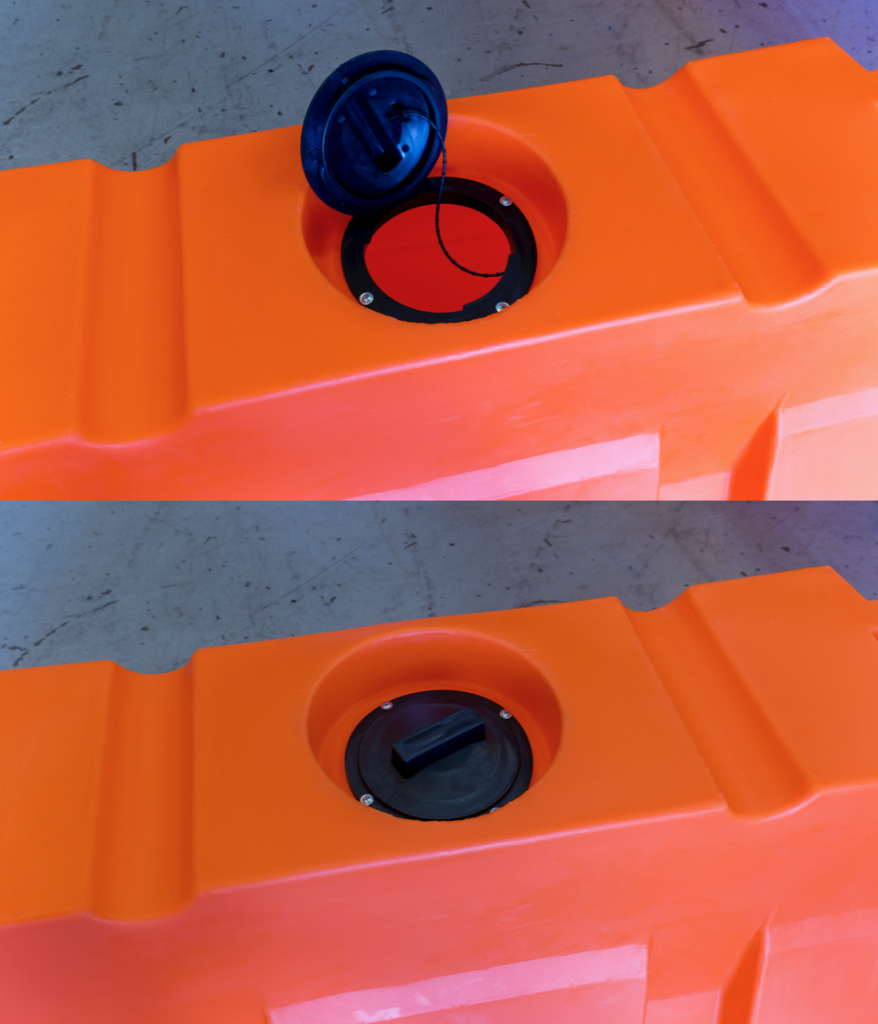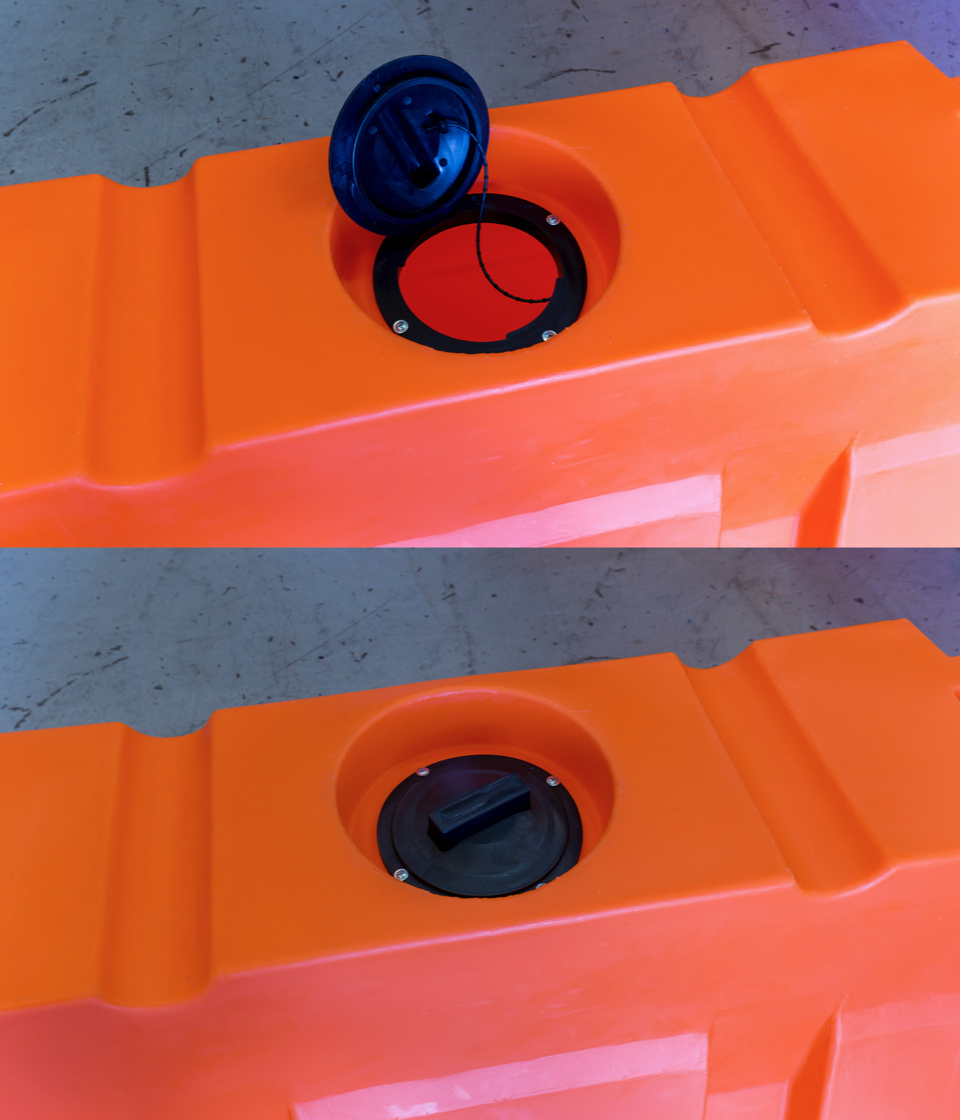
Ensuring the safety and fluidity of roadways, construction sites, or large-scale events often comes with challenges that demand innovative solutions.
For those who’ve ventured into project management or event organization, the complexity of selecting the right safety equipment can be a daunting task. How do you strike a balance between cost-efficiency and optimal protection?
Enter the world of water barriers, a game-changer in modern safety solutions. Wait – what is a water barrier, though? And what are water barriers made of? We’ll address common questions and help you determine if you need these for your project/event or not.
And for those in Texas who discover that these do belong in their safety and security process, Viking Rentals emerges as the beacon of reliability. We offer affordable water barrier rentals coupled with unparalleled support – what more could you ask for?
What is a Water Barrier?
First things first – what is a water barrier? The name may suggest an aquatic application, but as you’ll discover below, that is not the case.
Water Barriers Defined
These are robust safety devices designed to protect and delineate specific areas, primarily on roadways, construction sites, or at large events. They’re most commonly used to regulate traffic, safeguard pedestrians, and provide a physical demarcation for designated zones.
The defining characteristic of a water barrier is its hollow design, which allows it to be filled with water. When empty, these barriers are relatively lightweight and easily maneuverable, making transportation and placement a breeze.
Once filled, however, they become significantly heavier and more stable, standing firmly against the force of moving vehicles, gusty winds, or large crowds.
The use of water as a stabilizing agent allows for quick installation and removal, unlike concrete or other solid barriers, which can be cumbersome and time-consuming to install.
Key Differences Between Water Barriers and Other Barriers
While there are a myriad of barriers available in the market, water barriers boast some distinct advantages:
- Versatility: Due to their fillable nature, water barriers offer adaptable levels of stability. They can be partially filled for areas with less risk or fully filled where maximum stability is needed. This is in contrast to solid barriers, which come with a fixed weight and cannot be adjusted. And, you can choose to fill them with either sand or water.
- Mobility: When emptied, water barriers are much easier to transport and reposition than their concrete or metal counterparts. This makes them ideal for short-term projects or events where rapid setup and takedown are essential. They can be as light as 75 lbs each when empty.
- Safety: In the unfortunate event of a collision, water barriers are designed to absorb impact, reducing the potential for vehicle damage or injury. Solid barriers, especially concrete ones, can cause significant harm upon impact, leading to more severe consequences. They may redirect vehicles back into traffic as well, whereas water barriers do not.
What are Water Barriers Made Of?
Water barriers are the preferred choice for many because of their adaptability, safety, and efficiency are paramount. But, what are water barriers made of?
Water barriers are predominantly made from Linear Low-Density Polyethylene (LLDPE). This material stands out because of its robustness, granting the barriers the durability to withstand external challenges.
LLDPE boasts superior tensile strength and high impact resistance, making barriers made from it resilient against a range of external factors from vehicular impacts to harsh weather conditions.
One of the notable production methods in the industry is rotational molding. This process, which we utilize here at Viking Rentals, ensures a one-piece, seamless design. Such a construction technique minimizes weak points and potential fracture sites, which can often be the Achilles heel in multi-piece products.
Rotationally molded barriers ensure even wall thickness throughout, equating to uniform strength and stability. This coupled with the strength of LLDPE leads to durability you can count on.
The effectiveness of a water barrier isn’t just tied to its material but also its visibility. Many barriers are manufactured in colors such as OSHA-approved orange and white. These colors are selected for their high visibility, ensuring they stand out, be it a gloomy evening or a clear day.
Do You Need Water Barriers for Your Event or Project?
How can you be sure water barriers are the right choice for your event or project amidst the different security and organizational solutions at your disposal? Here’s why these have cemented their role as an indispensable asset in various scenarios.
Safety Considerations in High Traffic Areas
High-traffic areas, whether at a concert venue’s entrance or a bustling construction site, are often rife with potential hazards.
Vehicles, machinery, and pedestrians all vying for space can spell chaos, leading to accidents or bottlenecks. In these scenarios, clear demarcation becomes paramount.
Water barriers, with their robust structure and high visibility, serve as clear boundary markers, guiding traffic and preventing unintentional trespassing into restricted zones.
Especially at construction sites, where heavy machinery operates and large vehicles move in and out, barriers become the first line of defense, ensuring everyone from workers to visitors is aware of safe pathways and zones. They also protect against road debris from being thrown towards pedestrians, guests, or workers.
Benefits of Using Water Barriers for Crowd Control
Events, by their very nature, attract crowds. And while a large turnout can be a sign of success, it also presents challenges in crowd management. The goals are clear: ensure attendees’ safety and provide a smooth, enjoyable experience. Here’s how water barriers serve that need:
- Flow Optimization: Water barriers can guide attendees seamlessly, creating organized pathways and reducing instances of congestion. By directing foot traffic effectively, barriers help reduce wait times, particularly in areas like ticket counters, food stalls, or entry and exit points.
- Temporary Flexibility: Unlike permanent structures, water barriers offer adaptability. Need a pathway adjusted mid-event due to unforeseen issues? Barriers can be repositioned with ease, granting organizers the flexibility to adapt on the fly.
- Safety Reinforcement: Beyond just organization, barriers serve as a clear reminder of off-limits areas. This is particularly crucial in scenarios like outdoor concerts, where there might be equipment zones, restricted performer areas, or sections where potential hazards exist.
- Customization: Some events, like exhibitions or fairs, may have specific branding needs. Water barriers, given their sizable surface area, can double up as branding tools. By attaching banners or signage, organizers can leverage them as promotional or informational assets.
In conclusion, the question isn’t so much whether you need water barriers, but how they can elevate the safety and efficiency of your project or event.
In some cases, standard temporary fence rental will be more than enough. But for situations where vehicles raise a concern and you want added durability/safety, water barriers are an excellent choice. But should you rent or buy?
Water Barrier Rental vs Buying Water Barriers
Both water barrier rental and buying water barriers outright come with their own sets of benefits. Understanding your unique requirements and the nuances of each choice can help guide you toward a more informed decision.
Let’s look at the main considerations: cost, maintenance, storage, and service.
Cost Analysis: Short-term vs Long-term Needs
If your project or event is a one-off or an occasional affair, renting becomes the more financially prudent option. Renting eliminates hefty upfront costs, allowing for a more flexible budget allocation.
Additionally, for events or projects with varying sizes or locations, the type and number of barriers required can change, making rentals a flexible option without the commitment of ownership.
On the flip side, for entities that regularly require water barriers – think of construction companies with ongoing projects or event organizers with frequent large-scale events – purchasing may prove cost-effective in the long run.
While the initial investment is higher, the cost per use decreases over time, offering better value for consistent needs. That being said, you also have to factor in the hassle of maintaining and storing these barriers…
Maintenance and Storage Considerations
Owning water barriers means you’re responsible for their upkeep. While these barriers are designed for durability, wear and tear is inevitable.
Regular inspections, cleaning, and potential repairs are all on the owner’s checklist. Renting, however, often comes with the peace of mind that maintenance is typically handled by the rental company.
Storing water barriers post-event or between projects is a consideration that can’t be overlooked. They take up space, and ensuring they’re stored correctly to prevent damage is crucial. For those with limited storage capacity, this becomes an added logistical challenge.
Renting barriers alleviates this concern entirely. Once your event or project concludes, the rental company typically manages the pickup and storage, freeing you from both space and logistical burdens.
The Advantage of Having a Rental Service Set Up and Manage Your Barriers
Opting for a dedicated barrier rental service isn’t just about the barriers themselves – it’s about the comprehensive service accompanying them.
You don’t have to stress about the time, cost, and inconvenience of transporting, installing, and tearing down your barriers. Everything is handled from start to finish so you can focus on more important matters in your business or event.
Trust us – it’s worth renting for the peace of mind alone! But considering cost, maintenance, and storage along with the seamless service you get along the way, the answer is clear: renting water barriers often makes more sense.
Advice on Finding the Right Water Barrier Rental Partner
Before we wrap up this beginner’s guide on what water barriers are all about, let’s leave you with some advice on finding the right water barrier rental partner.
As we said from the start, if you’re in Texas, your search ends here at Viking Rentals. Otherwise, here’s how you can find the diamond in the rough near you that will provide effective water barriers paired with world-class support.
What to Look For in a Rental Partner
Some of this may be obvious, but don’t compromise on any of the following along your search for a water barrier rental partner:
- Experience and Expertise: Seek a rental service with a proven track record. Their experience will speak volumes about their reliability and ability to handle different scenarios.
- Transparent Pricing: No one appreciates hidden charges. Ensure your rental partner offers clear, upfront pricing without unpleasant surprises.
- Customer Service: An attentive and responsive customer service team can be a lifesaver, especially during urgent situations or last-minute changes.
The Importance of Compliance and Standards (e.g., NCHRP 350)
Compliance is paramount when renting water barriers. The National Cooperative Highway Research Program (NCHRP) 350 provides safety performance guidelines.
Ensuring your barriers meet these standards is paramount for the safety of your attendees and the reputation of your event or project. Always ask for certifications or compliance reports.
Evaluating Product Variety: Sizes, Optional Kits, and More
Your needs might be unique based on the nature of your event or project. Thus, the flexibility of choosing from various sizes, materials, and additional kits can make all the difference.
For instance, some projects might benefit from barriers with optional temporary chain link fence kits, while others might need privacy screens. Maybe you need 42” barriers in some areas and 32” barriers in others.
The point is that your rental provider should be able to accommodate a vast array of needs!
The Viking Rentals Advantage: Why Texans Trust Us
Why do Texas business owners, event managers, and construction companies trust Viking Rentals for water barriers? Simple – we offer the best balance of affordable prices, seamless service, and quality you can depend on!
We don’t just say we’re the best; we have the credentials to prove it. All our barriers comply with the NCHRP 350 standards, ensuring top-tier safety. From different sizes to the availability of optional kits, we pride ourselves on catering to the unique needs of each client.
From the moment you first reach out to the installation of these barriers on your site to the final tear down, you can expect to be made a priority every step of the way. And should anything go wrong during the duration of your rental period, you can count on us to make it right fast.
We serve the whole Texas region offering water barrier rentals in Dallas, water barrier rentals in Austin, water barrier rentals in Houston, and water barrier rentals in Fort Worth. Reach out today and request a quote to learn more!
Bringing Our Beginner’s Guide on Water Barriers to a Close
That concludes our beginner’s guide to water barriers. Hopefully, you have complete clarity on what a water barrier is, what it’s made from, and the role it can serve in keeping your project or event safe, secure, and organized.
Partnering with a trusted expert who can guide you every step of the way is essential if you’re renting water barriers. As we’ve mentioned a few times throughout this guide, you can count on us to provide top-notch products and unbeatable customer support.
So what are you waiting for? embark on your next project with unparalleled confidence and support by reaching out to Viking Rentals.

